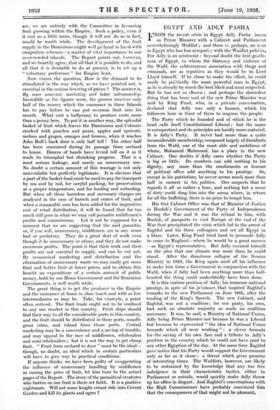EGYPT AND ADLY PASHA.
FROM the recent crisis in Egypt Adly Pasha issues as Prime Minister with a Cabinet and Parliament overwhelmingly Wafdist ; and there is, perhaps, no man in Egypt who has less sympathy with the Waiclist policies. For Adly is an aristocrat : beyond doubt the first gentle- man of Egypt, to whom the blatancy and violence of the Wafd, the subterranean association with thugs and criminals, are as repulsive as they would be to Lord Lloyd himself. If he chose to make the effort, he could easily be politically the most powerful man in Egypt, as he is already by much the best liked and most respected. But he has not so chosen ; and perhaps the shrewdest thing that has been said of the new Prime Minister was said by King Fuad, who, in a private conversation, declared that Adly was only a banner, which his followers bore in front of them to impress the people.
The Party which he founded and of which he is the head calls itself Constitutional Liberal ; but the name is unimportant and its principles are hardly more material. It is Adly's Party. It never had more than .a quite inconsiderable membership, composed largely ofilissidents from the Wafd, one of the most able and ambitious of whom, Mohamed Mahrnoud, has a place in the new Cabinet. One doubts if Adly cares whether the Party is big or little. Its numbers can add nothing to his dignity, any more than the emoluments or honour of political office add anything to his prestige. So, except in his patriotism, he never seems much more than half in earnest in his politics. One suspects that he regards it all as rather a bore, and nothing but a sense of duty could drag him into the arena where, in return for all the buffeting, there is no prize to tempt him.
His first Cabinet Office was that of Minister of Justice in Rushdi's Government of the Party of Independence during the War and it was the refusal to him, with Rushdi, of passports to visit Europe at the end of the War that precipitated the crisis which led to the arrest of Zaghlul and his three colleagues and set all Egypt in a blaze. Later, King Fuad tried hard to persuade Adly to come to England—where he would be a great success —as Egypt's representative. But Adly excused himself on the plea that our climate was more than he could stand. After the disastrous collapse of the Nessim Ministry in 1923, the King again used all his influence to make him form a Government in conjunction with the Wafd, when if Adly had be en anything more than half- hearted the thing could undoubtedly have been done.
It is this curious position of Adly, his immense national prestige, in spite of his faineance, that inspired Zaghlul's remarks to the new Parliament on June 10th, after the reading of the King's Speech. The new Cabinet, said Zaghlul, was not a coalition ; for one party, his own, had such an absolute majority as made no coalition necessary. It was, he said, a Ministry of National Union, Adly being Prime Minister not because he was a Liberal but because he represented " the idea of National Union towards which all were working " : a clever formula for the saving of his own face and a tribute to Adly's position in the country which he could not have paid to any other Egyptian of the day. At the same time Zaghlul gave notice that his Party would support the Government only as far as it chose : a threat which gives promise of interesting times. The Wafdists, however, are likely to be restrained by the knowledge that any too free indulgence in their characteristic tactics, either in Parliament or outside, would quickly make Adly throw up his office in disgust. And Zaghlul's conversations with the High Commissioner have probably convinced him that the consequences of that might not be pleasant.










































 Previous page
Previous page